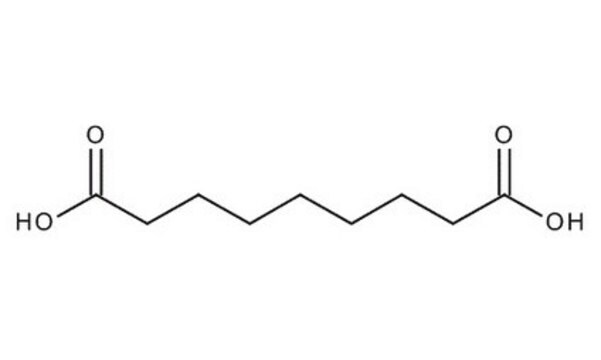All Photos(3)
About This Item
Linear Formula:
HO2C(CH2)7CO2H
CAS Number:
Molecular Weight:
188.22
Beilstein:
1101094
EC Number:
MDL number:
UNSPSC Code:
12162002
PubChem Substance ID:
NACRES:
NA.23
Recommended Products
vapor density
6.5 (vs air)
Quality Level
vapor pressure
<1 mmHg ( 20 °C)
Assay
98%
form
powder
bp
286 °C/100 mmHg (lit.)
mp
109-111 °C (lit.)
SMILES string
OC(=O)CCCCCCCC(O)=O
InChI
1S/C9H16O4/c10-8(11)6-4-2-1-3-5-7-9(12)13/h1-7H2,(H,10,11)(H,12,13)
InChI key
BDJRBEYXGGNYIS-UHFFFAOYSA-N
Looking for similar products? Visit Product Comparison Guide
Related Categories
Signal Word
Warning
Hazard Statements
Precautionary Statements
Hazard Classifications
Eye Irrit. 2 - Skin Irrit. 2
Storage Class Code
11 - Combustible Solids
WGK
WGK 1
Flash Point(F)
410.0 °F - closed cup
Flash Point(C)
210 °C - closed cup
Personal Protective Equipment
dust mask type N95 (US), Eyeshields, Gloves
Choose from one of the most recent versions:
Already Own This Product?
Find documentation for the products that you have recently purchased in the Document Library.
Customers Also Viewed
Seyed Dariush Taherzade et al.
Nanomaterials (Basel, Switzerland), 10(12) (2020-12-02)
Combined therapies emerge as an interesting tool to overcome limitations of traditional pharmacological treatments (efficiency, side effects). Among other materials, metal-organic frameworks (MOFs) offer versatilities for the accommodation of multiple and complementary active pharmaceutical ingredients (APIs): accessible large porosity, availability
Vaneeta M Sheth et al.
Journal of the American Academy of Dermatology, 65(4), 699-714 (2011-09-17)
Several methods of treatment are available to patients with melasma. First-line therapy usually consists of topical compounds that affect the pigment production pathway, broad-spectrum photoprotection, and camouflage. Second-line therapy often consists of the addition of chemical peels, although these must
Maria Zoeller et al.
Plant physiology, 160(1), 365-378 (2012-07-24)
Lipid peroxidation (LPO) is induced by a variety of abiotic and biotic stresses. Although LPO is involved in diverse signaling processes, little is known about the oxidation mechanisms and major lipid targets. A systematic lipidomics analysis of LPO in the
Rosemarie H Liu et al.
Archives of dermatology, 142(8), 1047-1052 (2006-08-23)
To evaluate the clinical efficacy of topical 20% azelaic acid cream and 15% azelaic acid gel compared with their respective vehicles and metronidazole gel in the treatment of papulopustular rosacea. Electronic searches of MEDLINE, EMBASE, BIOSIS, and SciSearch through July
Aditya K Gupta et al.
International journal of dermatology, 46(5), 533-538 (2007-05-03)
In December of 2002, the FDA approved azelaic acid 15% gel for the topical treatment of inflammatory papules and pustules of mild to moderate rosacea. Azelaic acid is a saturated dicarboxylic acid, which is naturally occurring and has been used
Our team of scientists has experience in all areas of research including Life Science, Material Science, Chemical Synthesis, Chromatography, Analytical and many others.
Contact Technical Service








